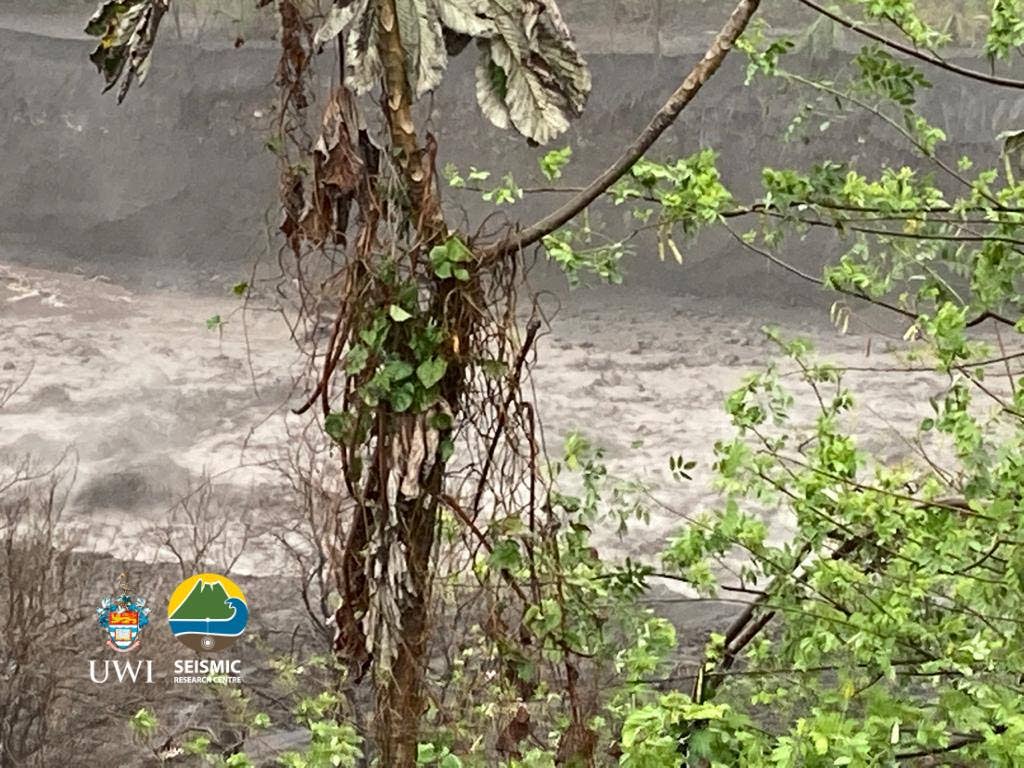Heavy rain causes floods, landslides in St Vincent

HEAVY rain coupled with an active volcano has added to the woes of Vincentians, as several areas of the island are now flooded and/or covered in mud and debris, with landslides in some communities.
Three weeks ago, the La Soufriere volcano erupted for the first time since 1979 and has since erupted explosively several times.
Residents of the northern part (red zone) of the island were evacuated and are at shelters or the homes of their friends/family in the safe zone.
There has also been an ongoing water shortage, as volcanic ash contaminated much of the water supply and some areas do not have a steady supply of pipeborne water.
Many countries in and outside the region have donated water and cash, among other things, to aid the country's relief efforts.
When the volcano first erupted, UWI volcanologist and seismologist Prof Richard Robertson warned that if there were heavy rain, it would result in the flow of lahars.
The UWI Seismic Research Centre, in a Facebook post, described lahars as a “fast-moving, dense mixture of rocks, ash and vegetation and water originating from a volcano. It has the consistency of wet concrete and can cause severe damage to rivers and valleys around the volcano.
"Lahars carry large amounts of volcanic material and may generate a rumbling sound. Where steam can be seen, these are known as hot lahars as the material is meeting still hot/warm deposits.”
As predicted, this happened in the wee hours of Thursday morning. Rain fell and the lahars gave no blighs. Trees were destroyed, flooding occurred in communities in the red, orange and green zones and there is a pileup of mud in many places, too.
Honorary vice-president for life of the country’s Red Cross Rene Baptiste told Newsday currently, the only people allowed in the red zone are those who have permission to tend to their livestock or who are assisting with cleanup efforts.
Previously, a number of people refused to evacuate, as they felt scientists were exaggerating the possible threats.
She said many parts of the country’s capital – Kingstown – are flooded.
“Remember, we are at the end of the mountain, if you want to put it that way. So when the rain comes down, it comes into the city.
"Remember, the city had ash and we cleaned up as well. So while we may have gotten rid of the ash on the surface, the ash has to go somewhere. So it was very extensive flooding, for instance, right in front the street in front of customs house, some areas in the market.
“The Red Cross has been doing a lot of work and they have been networking with other organisations to ensure that food delivery and other packages are done. They are really working very hard and a couple of persons called me to ask if they can volunteer.”
In a release, the country’s National Emergency Management Organization (NEMO) said since ashfall is thickest in the red zone and since so many trees there have been destroyed, the mudflow will reach the valleys.
It said, “There are also several reports of flooding and landslides in and around Kingstown and its surroundings as well as other areas prone to landslides and flooding.
“The public is asked to exercise caution especially persons living near rivers and streams and in areas prone to landslides as floodwaters are dangerous and can destroy lives and property.”
During Thursday’s virtual media conference on the update of the volcano’s activity, vulcanologist and seismologist Roderick Stewart said the floods in some areas are up to six inches deep.
But he warned, “People think they can drive through it, like the Fords, but because the water has material in it, it is incredibly powerful and it can still sweep vehicles away.”
He said the volcano has been “quieting down,” but he would not say it is going “back to sleep” yet, as that would be premature.
“It is quieting down, but we are watching very closely for any reversal of that.”
He reminded the public that Robertson had said this mudflow could continue even during the 2022 rainy season.
But even during these difficult times, citizens continue to have hope.
Baptiste told Newsday, “One of my friends went back to Wallibou (River) and up to Richmond (River), and with all that ash, they saw the little green shoots coming out the earth already. They will grow. It is a sign we shall survive, we shall overcome, we shall persevere.”

Comments
"Heavy rain causes floods, landslides in St Vincent"